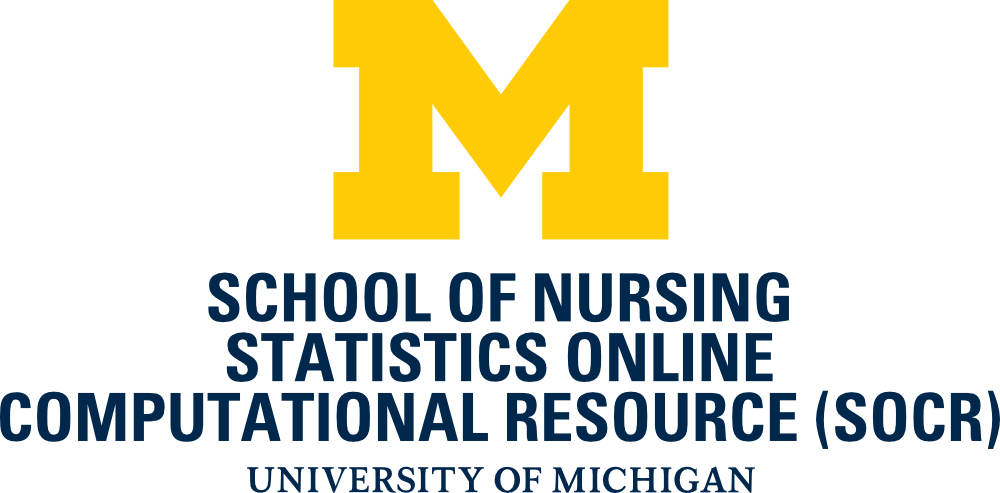Fall 2014: HS 550: Syllabus
Scientific Methods for Health Sciences: Fundamentals
Introduction course to probability reasoning and statistical inference.
Prerequisites
Quantitative General Elective course in past 4 years (examples include, but are not limited to mathematics, statistics, quantitative methods classes).Class Schedule
See UMSN Courses and UMich Office of the Registrar. Mondays:- 09/08/14, Lectures: 1-4 PM, Room
MedSci 2 South 3699;
Discussions: 4-5 PM, Rooms MedSci 2 South 3699 (sections A and B/Y. Li) and MedSci West 3697 (section C/J.Lavine) - 10/06/14, Lectures: 1-4 PM, Room
School of Dentistry (1011 North University): Room G550 ;
Discussions: 4-5 PM, Rooms G378 (sections A and B/Y. Li) and G390 (section C/J.Lavine) - 11/10/14, Lectures: 1-4 PM, Room
School of Dentistry (1011 North University): Room G550 ;
Discussions: 4-5 PM, Rooms G378 (sections A and B/Y. Li) and G390 (section C/J.Lavine) - 12/08/14, Lectures: 1-4 PM, Room
MedSci 2 South 3699;
Discussions: 4-5 PM, Rooms MedSci 2 South 3699 (sections A and B/Y. Li) and MedSci West 3697 (section C/J.Lavine)
Course Description
This course provides students with an introduction to probability reasoning and statistical inference. Students will learn theoretical concepts and apply analytic skills for collecting, managing, modeling, processing, interpreting and visualizing (mostly univariate) data. Students will learn the basic probability modeling and statistical analysis methods and acquire knowledge to read recently published health research publications. HS550 is a 4 credit hour course (3 lectures + 1 lab/discussion).Objectives
Students will learn how to:- Apply data management strategies to sample data files
- Carry out statistical tests to answer common healthcare research questions using appropriate methods and software tools
- Understand the core analytical data modeling techniques and their appropriate use
Examples of Topics Covered
- EDA/Charts
- Ubiquitous variation
- Parametric inference
- Probability Theory
- Odds Ratio/Relative Risk
- Distributions
- Exploratory data analysis
- Resampling/Simulation
- Design of Experiments
- Intro to Epidemiology
- Estimation
- Hypothesis testing
- Experiments vs. Observational studies
- Data management (tables, streams, cloud, warehouses, DBs, arrays, binary, ASCII, handling, mechanics)
- Power, sample-size, effect-size, sensitivity, specificity
- Bias/Precision
- Association vs. Causality
- Rate-of-change
- Clinical vs. Stat significance
- Statistical Independence Bayesian Rule
Teaching and Learning Methods
This course meets four times on campus and will use blended instructional techniques to deliver learning materials, provide instructional resources and assess student progress. Synchronous web-streaming of lectures/labs and asynchronous virtual office hour forums will be supported. Assignments will be announced on the web and will be electronically collected, graded and recorded. A variety of teaching methods will be used including lecture, Journal Club, discussion, small group work, and guest presentation.Textbooks
SMHS EBook and additional resources will be made available through the SOCR Wiki and may include chapters, websites for review, references, reports posted online, ebooks and other learning modules.Software and Computational Tools
We will only use open-source software, libraries and tools including the web-based SOCR tools (which require Java and HTML5/JavaScript enabled web-browsers) and the Statistical computing Software "R" (which you need to download and install the graphical user interface (GUI), RStudio). You can use any of the University of Michigan Computer Labs.Assignments and Evaluation Methods
- 40% Homework Projects
- 30% Midterm Exam
- 30% Final Paper
In this class, we will use the official UMich online gradebook (restricted access) for grading based on standard letter-grading distribution:
- A: 90%+
- B: 80-90%
- C: 70-80%
- D: 60-70%
- ...
- Plus and minus grades will also be used (e.g., "B-": 80-83%; "B+": 87-90%)
Student Code of Academic and Professional Conduct
Personal integrity and professionalism are fundamental values of the University of Michigan community. This course will be conducted in strict conformity with the UMich Student Code of Academic and Professional Conduct and related procedures.
Grading Policy
The lowest graded Homework assignment will be dropped. All Homework assignments must be completed by the corresponding deadline, however. No late assignments will be accepted. For students with genuine documented reasons for missing the midterm arrangements will be made. If after receiving the graded exams or HW/projects back you believe a grading error has occurred please see Dr. Dinov or your TA, within one week. Late regrade requests may not be accommodated. Reading assignments will be given. You will be responsible for the information covered in these assignments. Lecture and discussion attendance will be recorded from time to time.
Office Hours
- Dr. Dinov:
- Face-to-face: 10-11AM on Wednesdays (NIB 4341)
- Virtual Office Hours: Synchronous: Fridays 10-11AM, and Asynchronous: CTools Forum/Chat (restricted access)
- TAs:
- Yufang Li: Fridays 1:30 to 3:30PM, place SPH II M4332;
- Jennie Lavine: Wednesday 9:30-10:30 and Friday 1:30-2:30, place NIB 4354
- CTools Forum/Chat (restricted access)


